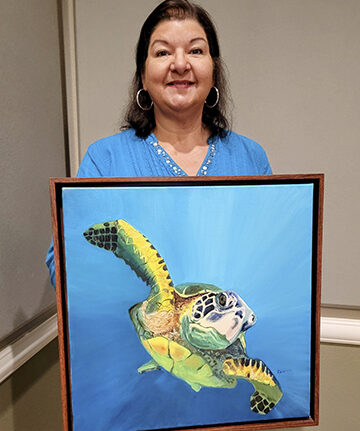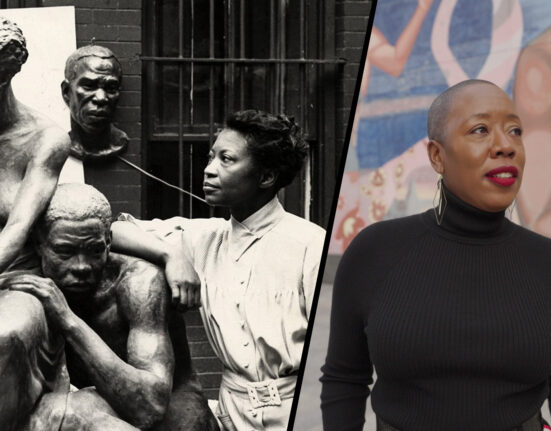Mark Anthony Mulligan’s drawings are a kaleidoscopic trip through the streets of Louisville, merging the real and the surreal, providing a look into the mind of a true original artist.
Mulligan, who died at the age of 59 last November, is currently being celebrated with a retrospective exhibition titled “Share a Little of Things of Yourself” at the newly-opened Outsider Art Museum & Gallery in the Portland Neighborhood.
The show covers decades of his work, most of which are his signature brightly-colored streetscapes of how he saw the city, primarily created in marker, pen, acrylic and watercolor. He was also a songwriter, and a book of his handwritten lyrics is on display.
Despite often struggling with mental illness and homelessness, Mulligan left a significant impact on Louisville. He often hung out on Bardstown Road, offering a wide smile and a gregarious wave.
“Share a Little of Things of Yourself,” which runs through Jan. 26, is a magnetic and profound retrospective of Mulligan’s art, bringing viewers deeply into the various eras of his love of drawing geography, buildings, signs and imaginative takes on everything around him.
Mulligan’s sister, Betty Dickerson, told LPM News that walking through the exhibition was heartwarming.
“It’s touching, in a good way, although I wish he was here to see this,” Dickerson said. “But, it’s a wonderful thing to see that he hasn’t been forgotten.”
The purpose of Outsider Art Museum and Gallery, according to the people behind it, is to “elevate voices that may be marginalized by society.” Director and co-founder Alex Huninghake was recruited by business owner and developer Gill Holland to run Outsider. He told LPM News that Mulligan was an obvious choice for the gallery’s first exhibition.
“Everybody who I started to talk to about him was just so supportive and down to help,” Huninghake said. “He clearly touched so many people in the city. And, to me, his art really exemplifies what outsider art is. As we dug deeper into it, it felt like a no-brainer to choose him.”

‘Do you remember?’
Everyone who goes to a Mark Anthony Mulligan exhibition seems to find a work that they gravitate to, get lost in, revisit and constantly find new details in. That was evident at the exhibition’s opening night in November, as a room full of viewers circled through the gallery over and over.
“Do you remember that restaurant?” a woman asked her friend at the show’s opening, pointing at one of the drawings.
Another work titled “The Big Boom By Exit 3” epitomizes Mulligan’s ability to merge the memory and feeling of a real place with cartoonish, dream-like elements. Dated July 1, 1989, it’s drawn in marker and filled in with watercolor, providing an interstate overlook of a West End exit seemingly set at night. Cars and semi-trucks zoom down the highway, as a police car speeds off an exit, circling ominous scribbles with the word “BOOM!”
The piece captures walking across an overpass at night and seeing the blurs of traffic and the chaotic way light bounces around, detailed by Mulligan’s yellow and purple watercolor work. It also feels otherworldly, like viewing that scene from another dimension. His mixture of realism and style was completely his own.
The most recent art in the exhibition is from about two years before his death, when he was in a nursing home.
The book of Mulligan’s songs is open for perusal. He wrote music with the same sort of earnestness, poetism and charisma that is the foundation of his visual works.
There are few words that can out-describe his own when it comes to his lyrical style, so here’s the first verse from “It’s Been A Little While,” which he finished on July 6, 1991:
It’s been a little while
When we all had some peace
It’s been getting a little sour
For no family reunion feast
It’s been quite a history
When we played in the mud
It is real honeybees
That are pest to our blood

Peacelands
The 2015 short documentary “Peacelands/Mark Anthony Mulligan” by Gregory Luchini Maddox offers a glimpse into Mulligan’s creative process, as large chunks of the film show him creating a single piece with marker, thinking out loud about the concepts and inspirations behind the work.
“Something tells me to put some crosses over here, and a heart,” Mulligan said in the film, shortly before adding those symbols in red marker above a sign that reads “Welcome City Of PEACELANDS.” He was filmed completing the work at The Healing Place, a shelter and recovery clinic.
“Do you know what I really try to do, to teach myself some things? I study a lot of people,” Mulligan said to the camera. “And what I’m really talking about is peace, peace culture and peacemakers. How to grow more peace in others.”
He also openly spoke about struggling with mental illness.
“I do hear voices a lot, and most of the voices I hear come from the devil inside me,” Mulligan said.
At the end of the “Peacelands” film, Mulligan is asked why he draws.
“I’ll tell you why I draw,” Mulligan exclaims, in an excited tone, with a wide smile.
He then breaks into song, clapping to keep the rhythm.
“I draw, to relieve my mind, time after time,” he sang. “And, when most of the time, I’m depressed, I keep drawing logos and signs. I love drawing to cheer me up.”

The Legacy Of Mark Anthony Mulligan
Artist and curator Al Gorman met Mulligan shortly after moving to Louisville in the mid-‘80s. He worked for Chuck Swanson at the original Swanson Gallery, which was located in the Schuster Building on Bardstown Road. Shortly after starting the job, Gorman often saw Mulligan carrying artwork with him and struck up a conversation.
The first time they spoke, Gorman bought a black-and-white map drawing from Mulligan, which is in the exhibit. The Swanson Gallery went on to represent Mulligan.
“I think of all the artists I have met, his work is the most Louisvillian,” Gorman said. “Even when the subject matter is not Louisville itself. His inspiration is always Louisville.”
Gorman organized Mulligan’s first exhibition, which was in Cincinnati in 1990, and also curated a retrospective at the Kentucky Folk Arts Center six months after Mulligan died.
In his career, Mulligan had exhibitions at the Chicago Art Institute, the Weston Art Gallery in the Aronoff Center for the Arts in Cincinnati, the Mennello Museum of American Art in Orlando and other locations. His work is also in the permanent collections at the Kentucky Folk Art Center in Morehead and the New Orleans Museum of Art.
One typical and important takeaway about Mulligan’s pieces revolves around the vantage point of his work.
“The typical Mark Anthony Mulligan drawing, he kind of draws it from the elevated viewpoint, like he’s a bird hovering above the scene,” Gorman said.
Mulligan’s sister echoed the same sentiment, saying that she was always amazed by the scope.
“You can see how intricate he is with the work that he does with the colors and then the buildings he likes to draw,” Dickerson said. “His mind was what was around him. To me, he [seemed] like he was in a helicopter looking down. I always said, ‘How did you do that?’”
At Mulligan’s funeral last year, people shared anecdotes about his life. Gorman said it was like they were in one of Mulligan’s drawings.
“It almost felt like Mark was hovering above the scene, you know, naming all of us the way he would items in his picture,” Gorman said. “There was almost a sense of calling or belonging there. It was frankly all because he led all of these individuals to this place in that moment.”
Support for this story was provided in part by the Great Meadows Foundation.







